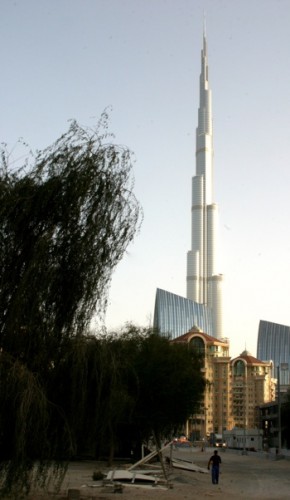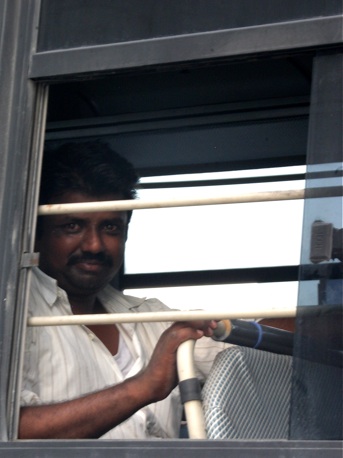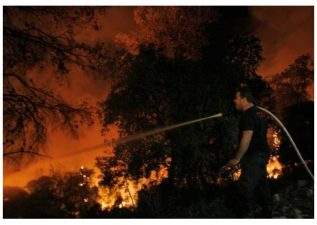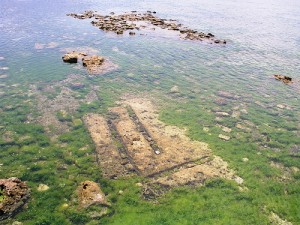 Outside temperatures often reach into the mid-fifties (celsius!) during Middle East summers. Construction workers feel the heat.
Outside temperatures often reach into the mid-fifties (celsius!) during Middle East summers. Construction workers feel the heat.
Behind every glamorous building in Dubai are hundreds of mostly South Asian workers. Yesterday, during a ten kilometer city hike from the Burj Khalifa to Bur Dubai, the quality of life for nearly half of the Emirate’s population came into view. Beyond glitzy Dubai are shadow neighborhoods where round satellite dishes, rooftop clothing lines, and crumbling walls painted in bright colors stand in stark contrast to shimmering skyscrapers and meandering villas.
Whereas malls and leisure areas set their thermostats at a bone-chilling 21 degrees celsius average, these semi-homes are mostly likely cooled with fans or not at all. Contemplating this, and encountering many workers on my walking tour, I wondered how it feels to work on a Middle Eastern construction zone in the dead of summer?
The heat of the day:
This is not a new question. Since 2006, the United Arab Emirates has banned construction companies from expecting their employees to work during the heat of the day during summer months.
Following a spate of heat-related illnesses and complaints, last year the UAE’s Ministry of Labor extended the ban to last an additional month. From noon to 3pm from June to September, workers are supposed to receive a shaded place wherein they can take refuge from the vicious midday sun.
Saudi sun:
This year Saudi Arabia will follow suit, except that country’s workers will only get a two month reprieve from the heat. Other Gulf countries such as Bahrain and Qatar have a similar policy that protects workers, but Kuwait does not.
Even so, last year 60 companies in Dubai were found to be in breach of the ban. Fines for violating the rules range from $2,000 to $8,000 depending on how many infringements occur, so there exists a high compliance rate, but critics argue that the municipality lacks the manpower to properly enforce these regulations. As a result, many workers are still forced to work at enormous peril to their health and safety.
True grit:
Emiratis comprise less than 20% of the UAE’s overall population, few of whom become involved with building projects. The bulk of construction work is completed instead by South Asian expatriates who according to the CIA World Factbook make up 50% of the overall population. In the last few years, more attention has been paid to their welfare.
Gulf news reported earlier this month that workers rights received top billing when Shaikh Hamdan Bin Mohammad Bin Rashid Al Maktoum, Dubai Crown Prince and Chairman of Dubai Executive Council, urged the newly restructured Permanent Committee for Labor Affairs to ensure the highest protection of workers’ rights in Dubai.
A/C is better than heat-stroke:
I don’t love air-conditioning. I don’t love its energy consumption and I don’t love the quality of what I’m breathing. But I am already addicted to it here.
At only 38 degrees, the daytime hours of stultifying heat are already miserable without any kind of cooling.
Although buildings could be warmer than 21 degrees, which would decrease energy consumption by leaps and bounds, it is not possible to live here without some serious A/C help.
In Alaska, fishermen only work so many months out of the year because of environmental and fish catch constraints. Granted, those months are hard and long and tiring, and families have to conserve their earnings for the rest of the year, but this is a pragmatic response to a problem that is beyond human control. Could a similar, but reverse solution work here? Can we envision a total summer ban?
More on summer temperatures in the Middle East:
How to Handle Record High Summer Temperatures
Summer Heat Jams Power Production in Oil Rich Saudi Arabia
Lebanon’s Lions, Tigers, and Bears Take the Heat







Excellent beat ! I wish to apprentice while you amend your website,
how can i subscribe for a blog web site? The account
helped me a acceptable deal. I had been a little bit acquainted of this your broadcast provided bright clear idea
I agree Sarah. At the moment I am in Egypt, looking around, realizing this is how it has always been with human beings. The powerful exploit the meek. I don’t get it, and I think there is a better way, but we have a lot of history to overcome first no?
I find it interesting/sad that these countries have money coming out the wazoo and are willing to build air-conditioned stadia and hotel for sport, but when it comes to giving their workers (the people literally building their country), they’re crammed and treated like cattle and inferiors.
I don’t know how they do it, my teenager became heat effected in one hour even while drinking plenty of water at 4 pm recently in the UAE.
I think using the relative cool of the night would be a good start. Also in hot climates elsewhere outdoor workers are supplied with cooling vests and bandanas designed to reduce heat stress. This is one example: http://www.roshgo.com/Merchant2/merchant.mvc?page=rc01/CTGY/00830
Another way people can help individually is by supporting AdoptaCamp a great organisation working to improve the quality of life for workers.
http://www.facebook.com/pages/AdoptaCamp/128987127135944?sk=info
Hi Nicole… you’re not getting replies? We’ll definitely look into that. Thanks so much.
Yes, most of them send almost everything back home.
They still have an intact system (sort of) where families all care for each other. That’s one reason so many of them cannot understand it when you say you don’t have kids. I just explained to one of ‘my’ taxi drivers that our society is different (not better).
Many live in very humble places here. Where we have 4 rooms for 2 people, they use those for rooms often for 10 people.
(PS: Is there a chance that you guys get a function on your blog where one can get replies by email?! :))
Today doctors called for this ban to be imposed based on temperature and not on dates. 38 degrees C = just over 100 degrees F. And it’s humid (though not fully yet.)
Thanks for illuminating this, Taf. I had heard about the South Asian working conditions some time ago, primarily re housing abominations. (Could you also include Farenheit for us ignoramuses?)
I’ve often thought about a new way of living in the Middle East: a reversal of day-night. Sleep during the day when it’s hot, and work and open the streets at night. Sunrise = Night-night.
Kuwait does have that rule ;p from 11am-3pm. I work in the oil sector and that’s how I came to know ’bout that rule (workerz start @ 5 in summer because they’ll be leavin early).
Perhaps many companiez are in violation, but the rule does exist here. Getting fined won’t cost much if you compare it to how much money they’d lose if they don’t finish on time, so that’s no solution if the company doesn’t care ’bout its reputation..
Oh, that’s good to know. Thanks Hunny!
Thanks Nicole and Oman Blog! I also find it incredible and humbling. I also understand that most of these workers send the bulk of their earnings back home to their families.
its already 44c in Muscat and Summer has just started. The workers here are often working 6 to 6 with a short break for lunch . How anyone can expect them to work in the mid-day sun is incredible – but not as incredible as the fact that they do.
I’m not sure there will ever be a solution for the misery of the workers in the Middle East. It sure doesn’t surprise me, that Kuwait doesn’t have that kind of law though.
I do remember though that in the worst of the heat at Noon I didn’t see people work at the construction sites – but they resumed later in the day and even worked some late evening hours.